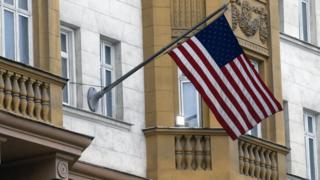
US President Donald Trump will sign into law a bill imposing new sanctions on Russia, the White House says.
Both houses of Congress backed the bill, which also includes measures against Iran and North Korea, but it was thought Mr Trump might veto it.
Russia has already retaliated by ordering cuts to US diplomatic staff and barring the use of some properties.
The sanctions are over Russia's 2014 annexation of Crimea and alleged interference in the US election.
Iran and North Korea are being penalised over their ballistic missile tests.
White House spokeswoman Sarah Huckabee Sanders said Mr Trump would sign the bill, but only after having negotiated "critical elements" of it. She did not specify what those elements were.
"He has now reviewed the final version and, based on its responsiveness to his negotiations, approves the bill and intends to sign it," she said.
- The Trump-Russia saga in 200 words
- Russia: The 'cloud' over the White House
- Reality Check: What are the sanctions against Russia?
- Russia and US bid to end diplomatic row
The sanctions came months after the Obama administration ordered the seizure of two Russian diplomatic compounds and expelled 35 Russian diplomats in response to alleged hacking of the US Democratic Party and Hillary Clinton's presidential campaign.
US intelligence agencies believe Russia tried to sway the election in favour of Mr Trump and several investigations are looking into whether anyone from his campaign colluded.
Russia has always denied interfering and Mr Trump insists there was no collusion.
The president has sought closer ties with Russia but analysts say any attempt to veto the new sanctions could have fuelled suspicion that he was too supportive of the Kremlin.
Russia's foreign ministry said on Friday that the US was "stubbornly taking one crudely anti-Russian step after another, using the utterly fictitious pretext of Russian interference in its internal affairs".
The statement said the expulsion of Russian diplomats "clearly violates the Vienna Convention on diplomatic relations and generally accepted diplomatic norms".
The ministry said it was seizing holiday properties and a warehouse used by US diplomats.
It was not immediately clear how many diplomats and staff would have to stop working at the main US embassy in Moscow and other consulates around Russia, but sources quoted by Russian news agencies said "hundreds" of people would be affected.

No comments:
Post a Comment